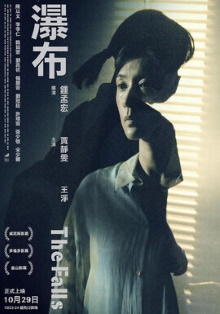Pretty much the same gang of filmmakers seem to be making the most highly acclaimed films in Taiwan and so I keep watching them. We’ve seen work by director Chung Mong-hong a few times before this and I have mixed feelings about them. I’d rank this as one of the better ones due to its solid foundations and how it treats the topic of mental illness with maturity. It does unfortunately have the same kind of shock twist ending that this gang seems to favor but that I feel is detrimental to treating it as a serious film.
Since her divorce a few years ago, Lo Pin-wen is raising her teenage daughter Wang Jing on her own while working as a corporate executive. When the COVID-19 pandemic hits, Jing has to go into isolation when a classmate tests positive. Jing is asked to stay at home too when her company finds out. Though it is just the two of them in the apartment, Pin-wen perceives her daughter as being willful and distant, refusing to interact with her. When she calls her ex-husband for help, he seems to think that this is normal behavior for a teenager and becomes uncomfortable when she tries to be too intimate. One night Pin-wen wakes up to see a raging storm outside and the windows open to let the rain in. She rushes into Jing’s room to find her belongings wet and her daughter missing. She goes out into the rain to search the streets for her. Yet the truth is that she was hallucinating and there was never any rain. The stress of her divorce and the added financial difficulties during the pandemic has caused her to have a nervous breakdown. Despite still being a high school student, Jing is forced to be the adult and put their lives back in order.
The shouting in the rain to search for someone scene is so stereotypical that it was a huge turn-off for me. So I was very glad to see that the film actually uses it as an example of something unbelievable and preposterous. There’s a bit of a feeling of this being yet another film about mental illness so soon after watching Beyond the Dream, but I’m really happy with how it’s approached here. Pin-wen’s psychosis affects every aspect of her life negatively including her ability to hold down a job, to manage the family’s finances and even to cook without burning the house down. It’s heartbreaking to watch Jing realize how far gone her mother is and step up to fulfill responsibilities like finding the money to pay long neglected bills and making sure that her mother takes her medication. While Jing is asked by the doctor to empathize with her mother, the film is very clear that taking medicine is a necessary part of the recovery process. On the whole, it is as much about Pin-wen slowly rebuilding her life after her psychotic episode as it is about the drama of her downfall, another point in its favor. So many films of this type just want to show scenes of the main character becoming increasingly unhinged. It’s also great to have Jing stand up to her father, to utterly reject his attempt to justify himself having an affair and to try to get her to like his new family.
There are a few things that I dislike. Some scenes seem tonally off, with music that feels inappropriate for the emotions in play. It does actually cast a Taiwanese singer in a supporting role who performs her song which is okay. In general though I think Chung doesn’t have a good ear for suitable mood music. My wife and I also found that Gingle Wang who plays Wang Jing is so much better as an actress than Alyssa Chia who plays the mother that the chemistry between them is lacking. When Wang parodies a man who is interested in the mother, Chia’s response is so half-hearted that it makes Wang’s efforts seem like a waste. Most of all, I found the twist ending to be cheap and tangential to the film’s themes. I can see the appeal to the director of adding something a little more mysterious and shocking to grab the audience’s attention. But to me it betrays a lack of confidence that the essential components of a film are strong enough to carry it. To me this is already strong enough and the twist only cheapens the capstone of Jing being able to relax enough to be the not-quite-yet adult daughter of the duo.
The film still does get enough things right to earn it a solid recommendation. It’s a modern take on mental illness that doesn’t attempt to romanticize it and it even makes effective use of the COVID-19 pandemic to heighten the stress on its main character. It’s a pity that COVID-19 kind of just disappears in the film. It would have been thematically more pleasing to have the virus getting under control due to vaccination and society opening up again more or less tracking Pin-wen’s own personal recovery.
